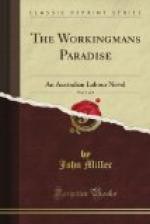It was heart-rending, her terrible grief, her abandonment of anguish which she vainly endeavoured to thrust back into her throat. With all her capacity for passionate love she bewailed her sister’s fate. Ned, striving to soothe her, all the while mingled his tears with hers. A profound sadness overshadowed him. He felt all his hopes numbed and palsied in the face of this omnipotent despair. This girl who was dead seemed for the time the symbol of what Life is. He had hated Society, hated it, but as its blackest abyss opened at his very feet his hate passed from him. He only felt an utter pity for all things, a desire to weep over the helpless hopelessness of the world.
Nellie quieted at last. Her sobs ceased to shake her, her tears dried on her pale face, but still she rested her head on Ned as if finding strength and comfort in him. Her eyelids were closed except for an occasional belated lingering sob she might have been asleep. Her grief had exhausted her. At last a coming footfall roused her. She raised her head, putting her hands instinctively to her hat and hair, pulling herself together with a strong breath.
“You are very kind to me, Ned,” she said, softly. “I’ve been so silly but I’m better now. I don’t often carry on like that.” She smiled faintly. “Let’s walk a bit! I shall feel better and I have such a lot to tell you. Don’t interrupt! I want you to know all about it, Ned.” And so, walking backwards and forwards in the moonlit streets, deserted and empty, passing an occasional night prowler, watched with suspicious eyes by energetic members of the “foorce” whose beats they invaded, stopping at corners or by dead-walls, then moving slowly on again, she told him.
* * * * *
“You know how things were at home on the Darling Downs, Ned. Father a ‘cooky,’ going shearing to make both ends meet, and things always going wrong, what with the drought and the wet and having no money to do things right and the mortgage never being cleared off. It wasn’t particularly good land, either, you know. The squatters had taken all that and left only stony ridges for folks like ours. And we were all girls, six of us. Your father was sold up, and he had you boys to help him. Well, my father wasn’t sold up but he might as well have been. He worked like a horse and so did mother, what with the cows and the fowls and looking after things when father was away, and we girls did what we could from the time we were little chits. Father used to get up at daybreak and work away after dark always when he was at home. On Sunday mornings after he’d seen to the things he used to lie on his back under that tree in front if it was fine or about the house if it was wet, just dead beat. He used to put a handkerchief over his face but he didn’t sleep much. He just rested. In the afternoon he used to have a smoke and a read. Poor father! He was always thought queer, you recollect, because he didn’t care for newspapers except to see about farming in and took his reading out of books of poetry that nobody else cared about. On Monday he’d start to work again, with only a few hours for sleep and meals, till Saturday night. Yet we had only just a living. Everything else went in interest on the mortgage. Twelve per cent. Mother used to cry about it sometimes but it had to be paid somehow.




